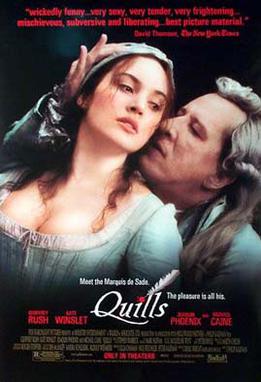
Quills is a 2000 period film directed by Philip Kaufman and adapted from the Obie award-winning 1995 play by Doug Wright, who also wrote the original screenplay. Inspired by the life and work of the Marquis de Sade, Quills re-imagines the last years of the Marquis's incarceration in the insane asylum at Charenton. It stars Geoffrey Rush as de Sade, Kate Winslet as laundress Madeleine "Maddie" LeClerc, Joaquin Phoenix as the Abbé de Coulmier, and Michael Caine as Dr. Royer-Collard.

Speak to Me of Love is a 2002 French drama film written and directed by Sophie Marceau and starring Judith Godrèche, Niels Arestrup, and Anne Le Ny. The first feature-length motion picture directed by actress Sophie Marceau, the film is about the breakup of a long-term relationship. Speak to Me of Love was filmed on location in New York City and Paris. In 2002, the film received the Montréal World Film Festival Award for Best Director and was nominated for the Grand Prix des Amériques.

Le Rouge et le Noir is a historical psychological novel in two volumes by Stendhal, published in 1830. It chronicles the attempts of a provincial young man to rise socially beyond his modest upbringing through a combination of talent, hard work, deception, and hypocrisy. He ultimately allows his passions to betray him.
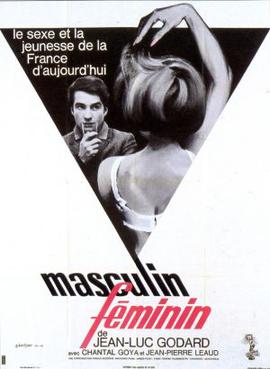
Masculin Féminin is a 1966 French New Wave film directed by Jean-Luc Godard. An international co-production between France and Sweden, the film stars Jean-Pierre Léaud, Chantal Goya, Marlène Jobert, Catherine-Isabelle Duport, and Michel Debord.

The Flame of New Orleans is a 1941 American historical comedy film directed by René Clair and starring Marlene Dietrich and Bruce Cabot in his first comedy role. The supporting cast features Roland Young, Andy Devine and Franklin Pangborn. It was made and distributed by Universal Pictures. It was the last of three films Dietrich made with producer Joe Pasternak who called it "in many ways, our most interesting."

Cléo from 5 to 7 is a 1962 French New Wave drama film written and directed by Agnès Varda.
La Chair de l'orchidée is a 1975 film by Patrice Chéreau as his directorial debut, adapted by him and by Jean-Claude Carrière from the 1948 book The Flesh of the Orchid by British writer James Hadley Chase, "a pulp-novel sequel to No Orchids for Miss Blandish" (1939). The film stars Charlotte Rampling, Simone Signoret, Bruno Cremer, Edwige Feuillère and, in a cameo, Alida Valli.

Venus Beauty Institute, also known as Venus Beauty, is a 1999 French romantic comedy. The story centers on three employees of a beauty parlor and their search for love and happiness. The film is directed by Tonie Marshall. It stars Nathalie Baye, Bulle Ogier, Samuel Le Bihan, Jacques Bonnaffé, Mathilde Seigner, Audrey Tautou, Robert Hossein, Claire Denis, Micheline Presle, Emmanuelle Riva and Elli Medeiros.
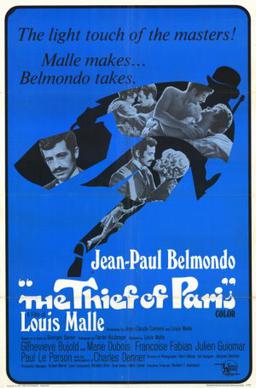
The Thief of Paris is a 1967 French crime film directed by Louis Malle and starring Jean-Paul Belmondo as a professional thief at the turn of the century in Paris. The film is based on a book of the same title by Georges Darien.
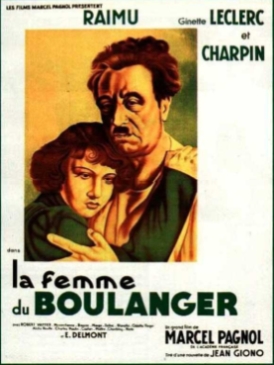
The Baker's Wife is a 1938 French drama film directed by Marcel Pagnol. It is based on the novel Blue Boy by French author Jean Giono and became the basis of the American musical The Baker's Wife.
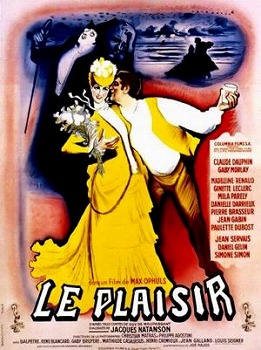
Le Plaisir is a 1952 French comedy-drama anthology film by German-born film director Max Ophüls (1902–1957) adapting three short stories by Guy de Maupassant — "Le Masque" (1889), "La Maison Tellier" (1881), and "Le Modèle" (1883).
Mon fils a moi is a French 2006 film directed by Martial Fougeron. The film is about an unbalanced mother bullying her 12-year-old son Julien.
Far North is an independently produced film by director Asif Kapadia, based on a short story by Sara Maitland. It was screened at various film festivals in 2007 and 2008 before an American DVD release on 23 September 2008.

In Case of Adversity is a 1958 French crime film directed by Claude Autant-Lara and starring Jean Gabin, Brigitte Bardot and Edwige Feuillère. It was released as Love Is My Profession in the United States. It tells the story of a married lawyer who rigs a trial to acquit a young female criminal he has become obsessed with, even to the point of imagining they might have a life together and start a family. The screenplay was written by Jean Aurenche and Pierre Bost after the novel In Case of Emergency by Georges Simenon. The film was released in France on 17 September 1958.
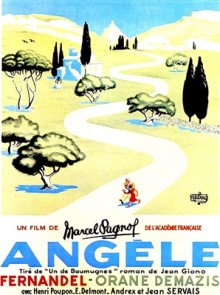
Angèle is a 1934 French drama film directed, produced and written by Marcel Pagnol, based on the 1929 novel Un de Baumugnes by Jean Giono. It stars Orane Demazis.
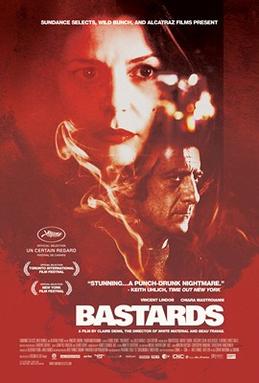
Bastards is a 2013 thriller film directed by Claire Denis. It stars Vincent Lindon and Chiara Mastroianni. It was screened in the Un Certain Regard section at the 2013 Cannes Film Festival.

17 Girls is a 2011 French coming-of-age drama film written and directed by Delphine and Muriel Coulin and starring Louise Grinberg as a teenage girl who becomes pregnant, later influencing 16 other girls at her school to become pregnant as well. The film had its premiere at the 2011 Cannes Film Festival, before being theatrically released in France on 14 December 2011.
The Smile is a 1994 French drama film directed by Claude Miller. Moving between reality and dream, it tells the story of a psychiatrist facing imminent death who follows the fantasy of one last love affair with a much younger woman. She also follows a fantasy of being a stripper who drives men wild, and is herself close to death.
Koh-Lanta: Cambodge is the 17th season of the French version of Survivor, Koh-Lanta. This season takes place in Koh Rong, Cambodia in the same location in which the previous season, Koh-Lanta: L'Île au Trésor was filmed. The main twist this season is instead of having the two traditional tribes, there are three in this season. In addition on day 4, three contestants were added to the game; one for each tribe. The season premiered on 10 March 2017 & concluded on 16 June 2017 where Frédéric Blancher won in a 6-2 jury vote against Clémentine Jullien to be crowned the Sole Survivor.
Anja Schüte is a German actress. Her acting career was launched through softcore erotica director David Hamilton, but she later became primarily known for her numerous German television roles.













